when you want, where you want.
CJ Television
No cookie-cutter way to create an entrepreneur, so what’s the catalyst? Inside KU’s venture test lab
Editor’s note: The University of Kansas’ School of Business is a partner of Startland News.
It’s a practical testing ground for KU students to flex their entrepreneurial muscles, Ryan Rains said, describing a business program built for could-be entrepreneurs who aren’t necessarily even business majors — and who, ultimately, might choose to abandon their concept ventures altogether.
The Catalyst program at the University of Kansas School of Business — revamped and relaunched in spring 2023 by Rains, director of entrepreneurship co-curricular programs for the business school — employs students and gives them opportunities to work out ideas and venture plans, introducing them to resources like industry mentors.
“If you’re curious about entrepreneurship, how can we meet you at the point of your curiosity and give you a safe, low-risk environment in which to start putting in reps?” asked Rains.
To apply, students must have an idea for a venture they could develop.
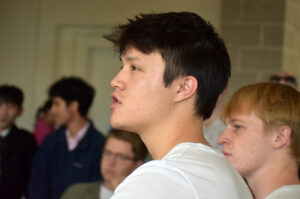
KU student Ashton Barker asks a question to Messenger Coffee’s Isaac Hodges during a spring 2025 tour of the Kansas City entrepreneur ecosystem, which included a stop at Messenger in the Crossroads; photo by Taylor Wilmore, Startland News
“I see it very much as like learning a language — if you don’t practice and continue using it, you’re going to lose it,” said Ashton Barker, a KU sophomore from Overland Park, who has been involved in the program for three semesters. “So having a place where you can be creative — replicating something like the Catalyst or taking pieces of that — and actually applying it to my professional life and then my personal, then being able to be creative on a day to day and have those entrepreneurial skills, I think, just breeds success.
“I really enjoy the community and network it comes with, as well,” he added.
The three-phase program has evolved from six students in one cohort guided by Rains to 40 this past semester with nine cohorts, eight guided by students.
“It’s very rare that you get a space in the business school where it’s just students,” noted Calvin Schenk, a junior from Topeka, who has also been involved in Catalyst for three semesters. “You get it in our clubs, but not quite like this. It’s one of the only spaces that I’ve ever been able to sit in a room with five other students who are all dealing with the same issues as me, same problems as me, and walk with them through that process.”
Finding the right way to plug in
During the first semester of the 10-week program, Rains said, students go through the business model canvas. By the end, they’re able to identify value propositions and customer segments, as well as understand other areas of the canvas. During the program, students also hear from guest speakers and have the opportunity to go on startup tours in Lawrence and Kansas City.
“Some of them realize in the first semester that this is an idea they don’t want to keep working on,” Rains acknowledged. “Some of them find success actually — depending on the size of what they want to do — and they’re able to actually start making tangible progress.”
“Then some others, they may identify, ‘Hey, I’ve made tangible progress. I don’t want to keep working on this, though, but I also don’t want to leave because I’ve really enjoyed being in the entrepreneurial space.’ So we just encourage them, like, ‘Where else could you plug in?’ And sometimes those folks become our guides.”
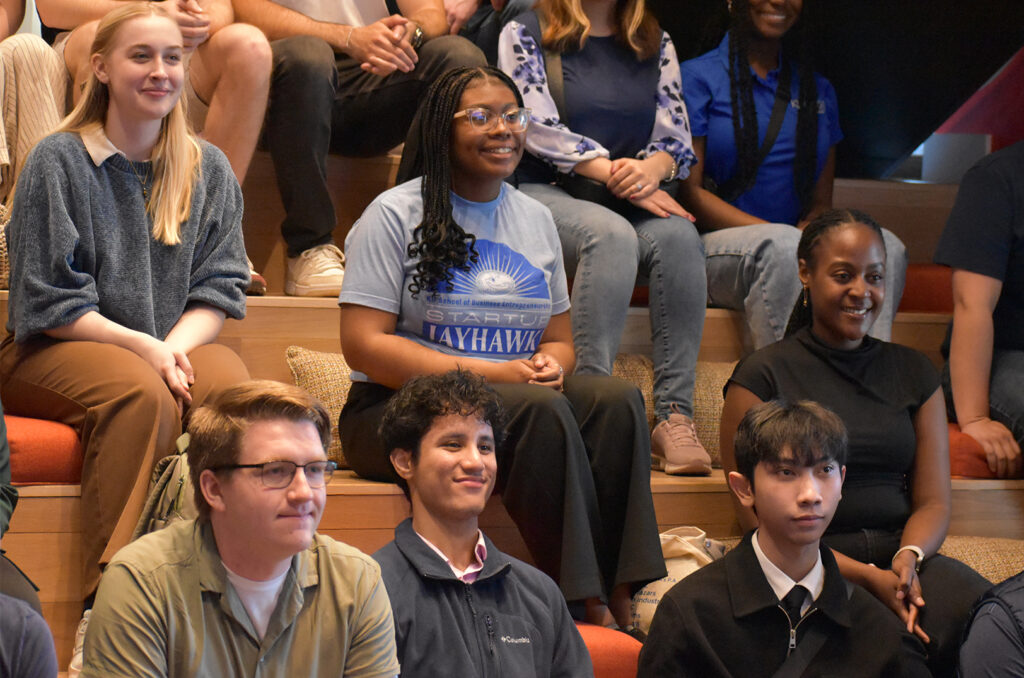
Andrea Atwood smiles amongst Catalyst students during a spring 2025 tour of the Kansas City entrepreneur ecosystem, which included a stop at Spark Coworking; photo by Taylor Wilmore, Startland News
Andrea Atwood, a junior from Chicago, joined Catalyst to build up her beauty business. After spending four semesters in the program and being a cohort guide this past semester, she said she is still selling some of her beauty products and has learned the foundations of running a business from the program.
“There’s so many parts of the business that you’re not aware of,” Atwood continued, “especially if I did want to end up scaling in the future. It gave me a lot of feedback on my business that I wouldn’t really get from my customer.”
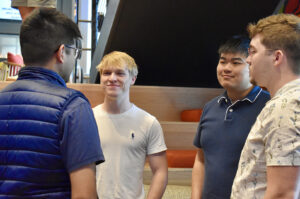
Calvin Schenk, center, chats with LaunchKC winner Jeffrey Annaraj, Cybership, left, during a spring 2025 tour of the Kansas City entrepreneur ecosystem; photo by Nikki Overfelt Chifalu, Startland News
Barker — who joined the program with an idea for a nonprofit to combat school violence — and Schenk — who joined to build up his family’s food truck business — both decided to quit pursuing their ventures and instead help their fellow students as guides through the Catalyst program.
“Leading our own cohort — me and Ashton together — it was that amazing experience of, ‘Wow, I don’t need to run my own business to still get this feeling that I really enjoy,’” Schenk explained, “‘which is leading, guiding, coaching people through that entrepreneurial process.”
“Having a place like Catalyst to be openly creative and also have these really engaging and interesting conversations has been really special,” Barker continued. “One of the things that I’ve found to be uniquely challenging — but also really, really enjoyable — is being able to learn how to facilitate conversation, as opposed to coaching and everything.”
“Because, at the end of the day, we’re their peers,” he added. “I’m not here to tell someone that this is the exact right way to do it, because — as Ryan says all the time, and it’s true — ‘There’s no cookie cutter way to create an entrepreneur.’ So having a place where we can help our members come to their own conclusions about where they’re at and how to be successful has been really, really awesome.”
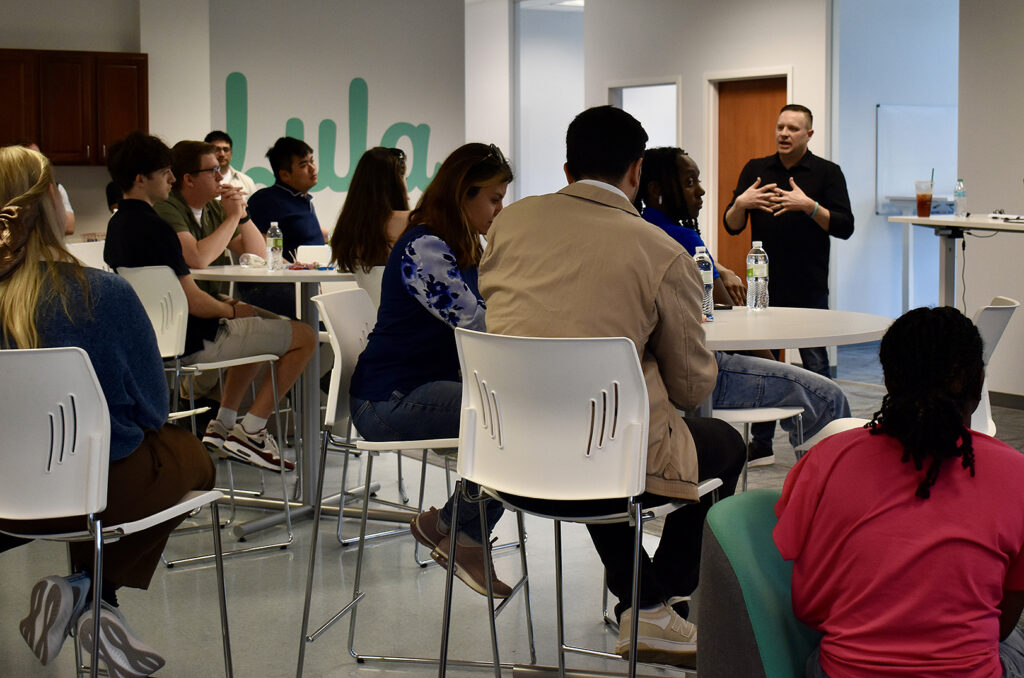
Kansas City startup founder Bo Lais leads a Johnson County stop on a spring 2025 tour of the Kansas City entrepreneur ecosystem, which included a stop at Lula‘s headquarters; photo by Taylor Wilmore, Startland News
Unexpected pathways
While Atwood, Barker, and Schenk are all students in the business school, they have started to see Catalyst grow to include students with other majors. Barker and Schenk’s cohort included mostly engineering students, they noted.
“The way that they think is completely different from what we do,” noted Barker, who is studying marketing and entrepreneurship with a professional selling certificate. “They don’t know the simple vocabulary that we think is second nature, but they know way beyond what we do, too. So being able to learn from each other has been really, really cool.”
“It’s easy to get isolated within one school,” he added. “We all fall under the blanket of KU, but it does often feel separated. And I think Catalyst has been a really good representation of what can be in terms of intermingling between the different departments. I think that’s something really special that we have here.”
Students from outside the business school who join the program often can’t fit an entrepreneurship class into their schedule and they don’t plan adding it as a major, minor, or certificate, Rains said.
“By adding something like this, they’re able to gain experience and exposure to business principles and entrepreneurship principles without necessarily having to sign up to pay for a course or to try to find a way to work it into what might be a rigid track,” he continued. “So this kind of lives in that third space and that’s been great to be able to serve them in that way.”
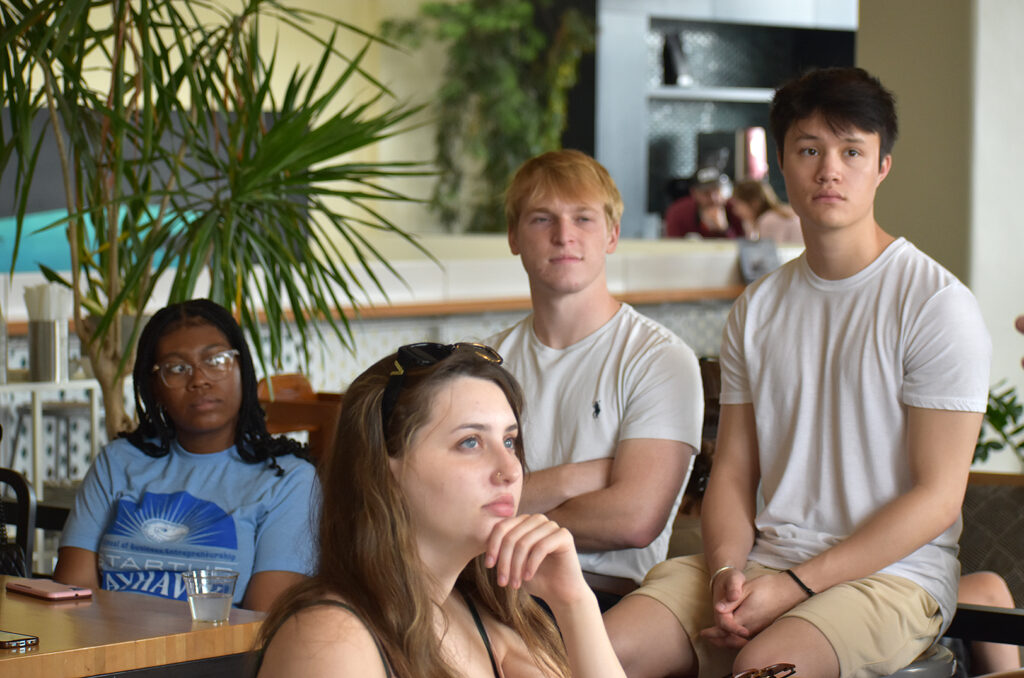
KU students Andrea Atwood, Calvin Schenk, and Ashton Barker listen during a spring 2025 tour of the Kansas City entrepreneur ecosystem, which included a stop at Messenger Coffee in the Crossroads; photo by Taylor Wilmore, Startland News
No matter what starts, start
Although Atwood, Barker, and Schenk don’t plan on pursuing entrepreneurship full-time after graduating, they said the lessons they’ve learned from Catalyst will still apply.
Atwood — a marketing major and an entrepreneurship minor— plans to continue her beauty business as a side hustle, she shared, hoping to maybe open a store one day. But in the meantime, she’s planning to work her way up the marketing ladder.
“I think the skills that I’ve learned in Catalyst have been helping more with my leadership,” she added.
A finance and business management major, Schenk said he plans to go into consulting after he graduates from KU and he feels like a lot of the coaching skills he’s learned through the program can be transferred to consulting.
“There’s a lot more to build on as you move into consulting,” he explained, “but client-based problem solving is the whole idea of the Catalyst, in a way, and so being able to facilitate those conversations is a huge, huge part of it.”
Schenk also noted that the skills they’ve learned can also apply to — not just their professional lives — but also their personal lives.
“Whether you’re thinking about customer relationships as maintaining long distance friendships, for example, or even managing your own personal finances,” he continued, “you can start to transfer all of our concepts into real-life issues. Suddenly, all these tools that are for developing your high-tech startup business can be used trying to manage your adult life after graduation.”
The post No cookie-cutter way to create an entrepreneur, so what’s the catalyst? Inside KU’s venture test lab appeared first on Startland News.
All Rights Reserved. Copyright , Central Coast Communications, Inc.
